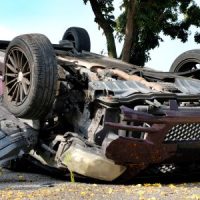Common Causes Of Rollover Accidents

Although they are relatively rare, rollover accidents are notorious for being one of the most dangerous types of car accidents in which a motorist can be involved. For instance, while they account for around only three percent of serious car accidents, they are thought to be responsible for as many as 30 percent of roadway fatalities. Having a better understanding of how these accidents occur can help drivers avoid them. However, determining the cause of a rollover accident is also critical when it comes to an accident victim’s recovery.
Most Rollover Accidents Involve a Collision
Rollover accidents can occur in a few different ways, but according to the Insurance Institute for Highway Safety (IIHS), as many as 76 percent of rollovers occur after a collision. Although modern vehicles are specifically designed to not roll over in the event of an accident, it is still possible, especially after a collision with another vehicle when:
- One of the vehicles was speeding, as the faster a car is traveling, the more force it imposes on the other vehicle, increasing the risk of a rollover upon impact;
- One of the drivers is distracted and so more likely to lose control of the vehicle and subsequently roll over; or
- One of the drivers is under the influence of alcohol and has far less control over the vehicle.
Not all pre-rollover collisions, however, are with other vehicles. Many rollover accidents, for instance, are the result of “tripping”, which occurs when a vehicle strikes an object that causes it to stop suddenly. Common tripping hazards include potholes, curbs, medians, and guardrails.
Road Hazards and Road Design Can Cause Rollover Accidents
Road hazards, like gravel and other debris can make it more likely that a vehicle will roll over in the event of a collision, as can poor road design, which includes things like:
- Poorly marked construction zones;
- Sharp curves;
- Signs that obstruct a driver’s vision; and
- Poorly timed traffic lights.
These types of problems also make it more likely that a person will be involved in a t-bone collision, in which one vehicle strikes the other at a 90 degree angle. Besides being dangerous in and of themselves, t-bone crashes often lead to rollovers.
Vehicle Design Can Contribute to Rollover Accidents
Vehicle design can also make it more likely that a person will be involved in a rollover accident. SUVs, for instance, with their high center of gravity, are among the vehicles that are most likely to roll over in the event of a collision or tripping event. Vehicle defects, like brake failure, problems with the accelerator, and tire blowouts can also cause a driver to lose control of a vehicle and eventually roll over.
Contact Our Florida Car Accident Lawyers
If you or a loved one were injured in a rollover accident in Florida, the dedicated Fort Lauderdale car accident lawyers at Boone & Davis can investigate your claim and if possible, help you seek the financial compensation you deserve. To get started on your case, please call us at 954-566-9919 and set up a free consultation with a member of our legal team.
Sources:
iihs.org/topics/fatality-statistics/detail/passenger-vehicle-occupants
google.com/url?sa=t&rct=j&q=&esrc=s&source=web&cd=&ved=2ahUKEwidtrCHkrz1AhUBD0QIHfP3Ds0QFnoECCIQAQ&url=https://crashstats.nhtsa.dot.gov/Api/Public/Publication/809438&usg=AOvVaw2FLimh6ETz9g6Jql-ubVNG
